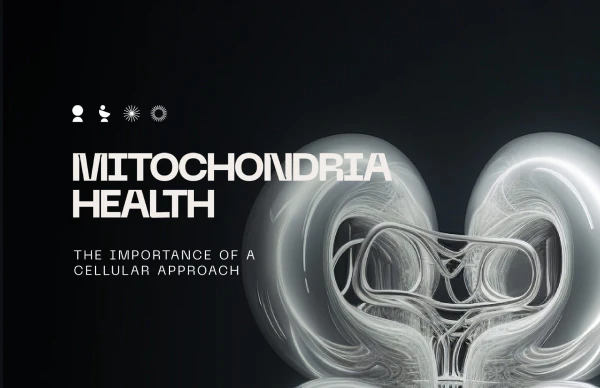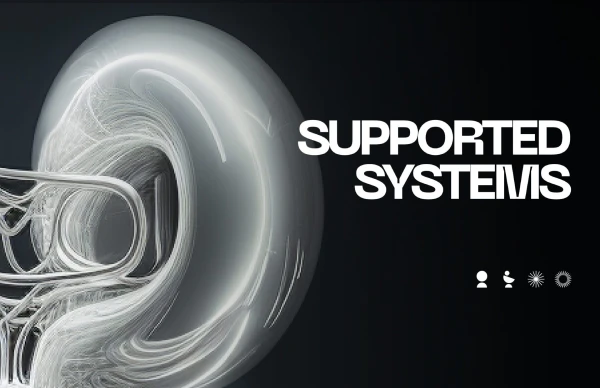Blog
Boost Energy With Mitochondria Supplements: Top Picks & Tips

Contents
The importance of mitochondria health
Top 5 mitochondria supplements for energy
Maximizing mitochondria health: Tips & strategies
Mitochondria supplements: Energize from within
Have you heard of mitochondria supplements? They offer a way to energize your cellular core, resolving fatigue at ground zero.
Some mentally foggy, physically exhausted individuals can address their troubles with lifestyle tweaks. But persistent symptoms suggest a deeper issue: struggling mitochondria.
Mitochondria generate every ounce of energy we use to function. But sometimes, they slow down and need a helping hand. Luckily, supplements and straightforward strategies restore them to working order.
Join us to discover the best techniques and products for mitochondrial support. We discuss medical treatments and behaviors that keep these structures in tip-top shape.
The importance of mitochondria health
Most people know mitochondria are the powerhouse of the cell. But what does this mean? Let’s start by zeroing in on the subcellular level.
Healthy mitochondria are important because they power our cells and ensure our bodies work effectively. There’s no energy, efficient metabolism, or life itself without them. They’re worth preserving, which requires knowing how they operate.
The mitochondria are organelles (“organs” within cells). They convert blood glucose into adenosine triphosphate (ATP). ATP is a molecule that fuels every cell within each system in your body. It’s the main “energy currency” we need to function.
Besides powering human bodies, these organelles have many secondary tasks. They store calcium, produce heat, and mediate cell development and death. As a result, mitochondria health correlates to your well-being.
Symptoms of low mitochondrial function
We divide mitochondrial issues into diseases and dysfunctions. The former is severe, occurs due to DNA problems, and requires medical interference. The latter is relatively common and easy to address.
Mitochondrial dysfunction happens due to aging and an unhealthy lifestyle. It causes tiredness, brain fog, diminished endurance, memory troubles, and low libido. All symptoms relate to a lack of energy in the body.
In most people, these organelles behave as well-oiled machines. But chronic inflammation and unhealthy eating can deteriorate them.
The modern American lifestyle is the recipe for poor mitochondria health. It includes plenty of stress, environmental toxins, and low-nutrient diets.
What do mitochondria need to stay healthy?
Mitochondria need oxygen, nutrients, and antioxidants to stay healthy. They benefit from habits that encourage energy production.
A constant supply of oxygen is central to energy production. Nutrients, like proteins, fats, and amino acids, fuel their metabolism. Antioxidants neutralize harmful oxygen residue, preventing damage and degradation.
A longevity-boosting lifestyle doubles as day-to-day mitochondrial support.
A balanced diet ensures all essential nutrients reach the cells. Exercise makes new organelles develop and existing ones strengthen. Reducing exposure to stress and toxins decreases the risk of oxidative damage.
What if you’re constantly experiencing the symptoms from above? Then lifestyle changes might not cut it. Supplementation could be necessary to restore your body’s engines.
Top 5 mitochondria supplements for energy
Many chemical compounds function as mitochondria supplements. Which are the most effective?
Oft-suggested options include antioxidants, magnesium, and omega-3 fatty acids. While these aid all areas of your well-being, they’re not mitochondria-specific.
You can include these supplements in your diet, but why not take things further? Try these five treatments to reshape your health from the inside. They require expert medical guidance but can be game-changing for your energy levels.
1. NAD+
NAD+ stands for “nicotinamide adenine dinucleotide.” It’s key to cellular energy and health. It exists in each cell in your body and participates in hundreds of vital processes. Its levels drop as you age, making it a number one mitochondrial supplement for adults.
This coenzyme works as a “helper” molecule. It binds to enzymes and supports healthy physical functions. It aids sirtuins, a group of proteins that maintain cell homeostasis (balance).
NAD+ relates to longevity, energy production, cell repair, and food digestion. Supplements can enhance metabolism, promote brain function, and protect you from aging.
You can get this compound from food sources, but it’s not the most effective route. Our expert-developed, dose-specific NAD+ IV therapy is the best way to keep it at optimal levels.
2. Semax
Semax is a synthetic peptide that mimics the adrenocorticotropic hormone (ACTH). It controls the production of cortisol, helping the body and mind respond to stress. It’s a mitochondria supplement for increasing their resistance to instability and dysregulation.
ACTH typically gets secreted by the pituitary gland during tense situations. It activates the adrenal gland, causes cortisol production, and triggers a stress response. Semax has similar effects.
Through this mechanism, Semax has nootropic and analgesic effects. Mentally, it may aid learning, memory retention, and decision-making. Physically, it seems to dull painful sensations.
This peptide may also offer oxidative protection. When free radicals over-accumulate, mitochondria can mutate and lose effectiveness. Semax’s effects curtail this issue.
3. Cerebrolysin
Cerebrolysin is a neuropeptide medicine that promotes neurological health. It’s used to treat neurological conditions like strokes and dementia. By helping brain cells regenerate, it keeps the mind sharp and clear.
This neuropeptide modifies two signaling pathways in the brain, both working on neural network maintenance. Its effects may fight mental aging symptoms in folks with or without diagnoses.
Another effect of Cerebrolysin is mitochondrial support. An animal study demonstrated it restores mitochondria structure. The test was on brains with Alzheimer’s and dementia, but this benefit may extend to healthy people.
Upon brain trauma, Cerebrolysin reduces inflammation and reduces toxic protein levels. Both could otherwise cause neurodegeneration, making it super-valuable for patients.
4. Pinealon
Pinealon is a synthetic peptide that protects cells against hypoxia. This condition happens when there’s not enough oxygen in the tissues. It triggers many adverse symptoms, including restlessness, confusion, and labored breathing.
This compound is a “peptide bioregulator” for its effects on the DNA. It directly interacts with the genome, activating cell regeneration genes. Its impact on the pineal gland makes it an excellent substance for mental health.
This protective peptide has diverse beneficial effects. It may offset aging symptoms, enhance cognition, and regulate the circadian rhythm.
Pinealon’s effects reach outside of the nervous system, too. It protects muscle cells and promotes fat loss. It’s also a handy mitochondrial supplement for its anti-oxidative properties.
5. PE-22-28
PE-22-28 is the synthetic version of the naturally occurring spadin peptide. It’s a potentially ground-breaking antidepressant, muscle aid, and neurogenesis supporter.
This peptide is an antagonist of TREK-1, a potassium channel that maintains membranes. Its deletion makes mice depression-resistant, offering a potential treatment for this condition. It’s also useful for the production of neural and muscle cells.
PE-22-28 addresses depression symptoms according to mice models. It causes fewer side effects than antidepressant medication. It might facilitate neurogenesis, letting your mind produce new, better-habit synapses. This trait could make it useful post-brain injury, too.
On the muscle level, the peptide promotes muscle relaxation. It helps your body respond to mechanical stimuli and loosen after them.
Maximizing mitochondria health: Tips & strategies
Supplements are an excellent way to kick your cells into gear. But why rely solely on medicine, even if it’s natural? Mitochondria therapy works even better paired with energy-boosting lifestyle strategies.
Start your journey toward more energy with a healthy lifestyle. Eat a balanced diet, move daily, and avoid nicotine and alcohol. Mitochondria supplements will be more effective once you have a baseline set up.
What if you wanted to go a step further? Employ these five tips to supercharge your mitochondria.
1. Reduce your carb intake
Consuming simple carbs causes your blood sugar levels to rise. This spike may cause inflammation and strain the mitochondria. Cutting your carbohydrate intake optimizes mitochondrial functioning and reduces free radical production.
Load your plate with non-fatty meat, fish, vegetables, nuts, seeds, and fruits. Consume just enough carbs to feel satiated. As a bonus, these foods have antioxidant properties that protect the mitochondria.
2. Try intermittent fasting
Intermittent fasting is a meal-timing schedule where you eat for a fixed number of hours each day. It’s a popular trend in the fitness community, especially for weight loss. It seems to improve mitochondrial health, too.
The non-eating hours decrease the available energy stores in your system. Your cells produce more NAD+ to compensate. This coenzyme improves mitochondrial function, and its benefits may be long-term.
This idea is still in the realm of a scientific hypothesis, but it has anecdotal evidence. People who do intermittent fasting report higher mental and physical energy levels. Another notable benefit is higher-quality, easier sleep.
3. Get intense daily exercise
Like carb restriction and intermittent fasting, strenuous exercise depletes the body of energy. According to scientists, this process might increase NAD+ availability.
There’s another reason why working out offers mitochondrial support. Exercise expands the network of mitochondria by promoting mRNA production. These molecules do energy-related work within the organelles, eventually multiplying them.
A sedentary lifestyle weakens the cell powerhouses, while an active one empowers them. A study found 12 weeks of training doubled mitochondrial content within the muscles.
We still lack broader studies to back up these claims. But anecdotes agree with it: you’re more energized when you exercise.
4. Prioritize quality rest
Enough sleep lets the body regenerate and perform its “housekeeping.” The system clears toxins while you’re asleep, eliminating the mitochondria-damaging free radicals. As a result, they produce plentiful energy during your waking hours.
The opposite happens when you’re exhausted. A lack of sleep causes cortisol levels to rise, harming mitochondria health. It’s a vicious cycle of feeling low-energy and not reaching your fullest potential.
Beyond sleep, relaxing activities could preserve mitochondria. Meditation, massages, and yoga reduce cortisol levels and inflammation in the body. They’re harm reduction mechanisms against the inevitable day-to-day stress.
5. Consider cold exposure
Short-term cold temperature exposure rejuvenates your system. While it doesn’t sound comfortable, an ice bath may increase your cells’ mitochondria mass.
The existing proof is from an animal study where researchers had rats swim in cold water. It increased the amount of proteins responsible for initiating mitochondria production. The effect persisted for 15 days.
What’s more, cold exposure can increase your metabolic rate. You burn more energy to maintain your temperature. The now-familiar NAD+ process ensues.
Mitochondria supplements: Energize from within
Mitochondria are cellular engines that drive each process within your body. They matter in every aspect of your life, so why not give them extra attention?
Live a healthy life to nip mitochondria troubles in the bud. Folks with long-standing fatigue can consider supplements and lifestyle strategies. This approach will rejuvenate your body and leave you feeling your best.
Do mitochondria supplements seem like the right option for you? Visit LIVV Natural to get expert medical advice and assistance during your journey.
Author: Dr. Jason Phan NMD – Founder of LIVV Natural – Anti-aging – regenerative medicine – peptide therapy


